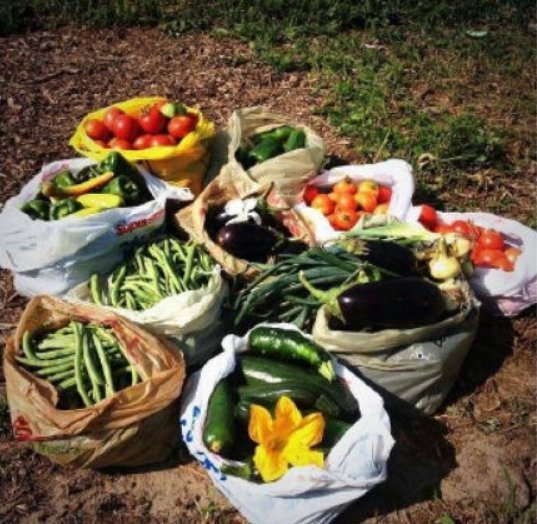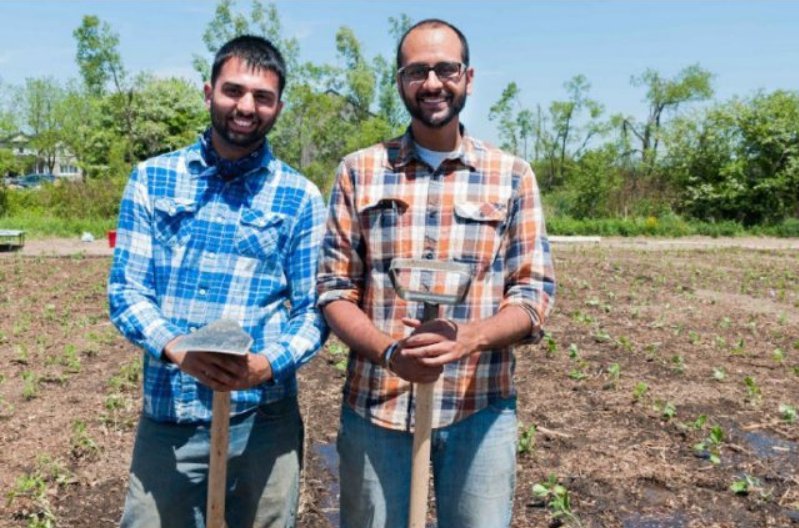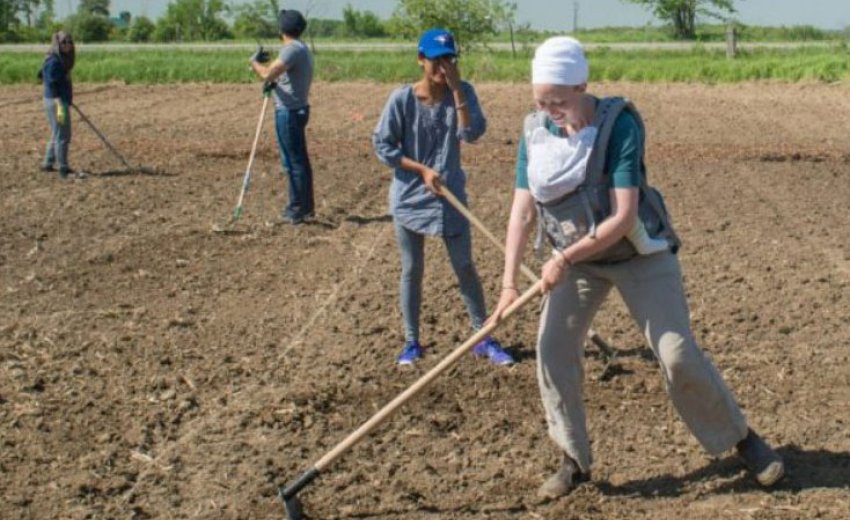— and food for those in need
A university class assignment turns into a social enterprise that brings a community together — and fresh produce for food bank clients in Peel.
| BIKRAM SOHI PHOTO Volunteer Baghael Kaur (in white turban), carrying her 8-month-old daughter Rundeep, tilled the land on the Good Karma Farm in east Caledon. |
Wednesday, October 8, 2014: Gagan Singh Batth and Jaskaran Singh Sandhu believe they can grow karma by growing crops for those in need of healthy food.
The Brampton duo’s social enterprise, KarmaGrow, has reaped its first harvest — 1,500 pounds, more than half a tonne — of fresh and luscious produce for thousands of local food bank clients who would otherwise have to bear with meals full of non-perishable food in tins.
 |
| JOE TICAR PHOTO Volunteers harvested fresh produce and bagged them up for deliveries to the three participating food banks in Peel |
“The project has definitely added to the food security for Peel Region residents. It’s about community coming together to help us out,” said Daven Seebarran of the Seva Food Bank, which, along with Knights Table and Good Food Brampton, helps run KarmaGrow’s community farm in Caledon.
This is how Sandhu’s and Batth’s simple idea works: secure donated agricultural land, offer training in farming, seek community partners to provide volunteers, and together share the rewards of the hard labour.
 |
| JOE TICAR PHOTO Gagan Singh Batth, left in blue, and his brother-in-law, Jaskaran Singh Sandhu, co-founders of KarmaGrow, a social enterprise that develops community farming to supplement partnered food banks with fresh produce. |
The two-acre Good Karma Farm, just a 20-minute drive to the north of Pearson International Airport, is believed to be the only community food-sharing farm in Canada that operates at such a scale, as most are in urban centres and run in small plots or on rooftops.
The seed of KarmaGrow was sown in 2012 when Batth, 24, had to come up with a social enterprise and business plan for a class assignment in his bachelor of commerce studies at Humber College.
Coming from an immigrant family of farmers in Punjab, Batth’s parents just bought a 100-acre “hobby farm” in Dundalk, Ont., a 30-minute drive north of Orangeville, in 2011.
“We had the experience of taking care of a farm and we grew more than we needed. We had more than enough to give it out to families and friends,” said Batth, a human resources consultant.
“We have agricultural lands everywhere sitting for development purposes. Why don’t we use the opportunity to grow fresh produce and share it with the community? It’s simple and easy.”
However, turning the idea into action was far more difficult. Batth’s family farm was too far for community volunteers to get to and a proposal to partner with a local high school for the farming initiative fell through.
In April, Sandhu, Batth’s brother-in-law, met with Gurpreet Somal, a commercial farmer in the Sikh community, who donated to KarmaGrow two of the 45 acres of his farmland, which is much more accessible for volunteers.
Through his community work, Sandhu, a criminal lawyer, quickly got other community groups on board. The Region of Peel donated 40 tons of compost; Ecosource, an environmental group, offered training; the World Sikh Organization helped secure the land and funding; the food banks co-ordinated volunteers and maintained the farm.
Sandhu and Batth spent weeks preparing the land so volunteers could start planting anything from tomatoes to eggplants, zucchini, corn, squash, peppers and chili by the end of May.
Each of the three participating food banks was allotted their own plots but their volunteers must also nurse the communal land. All harvests are shared among the groups.
“It’s a lot of back-breaking work. Combating weeds without chemicals was the hardest thing,” said Sandhu, who visits the Caledon farm twice a week to supervise the effort. “But this is such a wonderful collaboration to get the community involved. If we can get land within the city, the sky is the limit.”
KarmaGrow has already secured another two acres of donated land, near Castlemore and Gore Rds. to repeat the success of their pilot project.
Earlier in the season, crops on the farm were attacked by beetles and volunteers had a lengthy and healthy debate over whether to use pesticides or stick to the project’s organic principle. Eventually, they reached a consensus to use soap spray to kill the bugs, and it worked.
Volunteer Gursharn Kaur Gill of the World Sikh Organization, an advocacy group for social justice, said the farming initiative is great for community building and helps address poverty and food insecurity issues in Peel.
“It’s a fun experience volunteering on the farm, meeting people from other organizations. There’s a sense of camaraderie. Although we all have different plots, we all help each other out,” said Gill, 26, also a criminal lawyer.
“You have a feeling of community and what we can accomplish together. It’s a very good feeling.”
Being raised by a single mother in the Jane St. and Finch Ave. neighbourhood, volunteer Baghael Kaur said being part of the farming initiative is a healing and empowering experience.
“Many of us are disconnected from where our food comes from. Here, we get to plant, nurse, weed, and see the end results of something nourishing and practical,” said the 34-year-old Brampton resident, who volunteered with her 8-month-old old daughter Rundeep in tow.
“Karma means you harvest what you plant. When you do good, it comes back to you,” added Kaur, who studies to be a nutritionist. “KarmaGrow represents the concept in both the literal and spiritual sense.”
